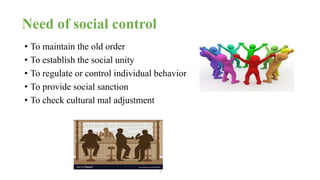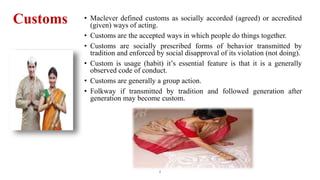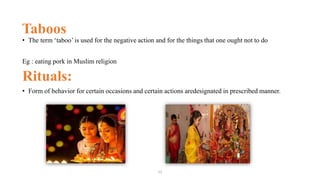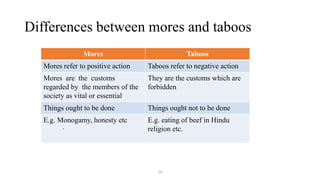Social control
- 1. Social Control âCustoms â Conventions, Folkways, Mores, Rituals, Taboos Reshma J Murugan Assistant Professor Agricultural Extension Kumaraguru Institute of Agriculture, Erode, Tamil Nadu 1
- 2. Social control âĒ Social control is the pattern of influence the society exerts on individuals and groups to maintain order and establish rules in the society. âĒ Mannheim defined social control as,â the sum of those methods by which a society tries to influence human behaviour to maintain a given orderâ. 2
- 3. Means of social control 3
- 4. Informal means of social control âĒ Belief âĒ Ideologies: Ghandhiism, capitalism, communism âĒ Social suggestions 4
- 5. âĒ Customs âĒ Folkways âĒ Mores âĒ Religion âĒ Art and literature âĒ Humour and Satire âĒ Public opinion 5
- 6. Formal means of social control âĒ Law âĒ Education âĒ Coercion 6
- 7. Need of social control âĒ To maintain the old order âĒ To establish the social unity âĒ To regulate or control individual behavior âĒ To provide social sanction âĒ To check cultural mal adjustment 7
- 8. Customs âĒ Maclever defined customs as socially accorded (agreed) or accredited (given) ways of acting. âĒ Customs are the accepted ways in which people do things together. âĒ Customs are socially prescribed forms of behavior transmitted by tradition and enforced by social disapproval of its violation (not doing). âĒ Custom is usage (habit) itâs essential feature is that it is a generally observed code of conduct. âĒ Customs are generally a group action. âĒ Folkway if transmitted by tradition and followed generation after generation may become custom. 8
- 9. Folkways âĒ Folkways are expected forms of behavior but are not rigidly enforced. âĒ Folkways are the customary ways of behaving in society. âĒ Folkways are recognized ways of behavior in a society. âĒ The Folkways are socially acceptable ways of behavior. âĒ Folkways are otherwise called as Usages sometimes. 9
- 10. âĒ Accepted as appropriate but not insisted upon âĒ Help individuals in a group to order social life in a smooth and harmonious way âĒ The results of frequent repetition of petty (little) actions âĒ They arise from experience âĒ Non-observance of folkways is not a vital matter âĒ Disapproval is shown by lifted eyebrow expression of moderate surprise or smile 10
- 11. Mores âĒ The customs or patterns of behavior, which are regarded by members of social system as vital and essential to the welfare of the group. âĒ They show what is right for the welfare of group. âĒ Mores may be defined as those customs, which are held to be essential to ethical or moral values of people. âĒ Mores are the socially acceptable ways of behavior that do involve moral standards (regulations) and violation of more may result in severe social action âĒ The term more is used for those things that are ought to be done. âĒ It is used for positive actions. âĒ Mores are insisted upon individuals. âĒ Society exerts pressure to conform the regular pattern and it not followed individual gets penalty from society. 11
- 12. Taboos âĒ The term âtabooâ is used for the negative action and for the things that one ought not to do Eg : eating pork in Muslim religion Rituals: âĒ Form of behavior for certain occasions and certain actions aredesignated in prescribed manner. 12
- 13. Conventions âĒ These are customs regulating more significant social behavior. Eg: Being polite to others Using knife, spoon or fork for eating etc. 13
- 14. Differences between mores and taboos Mores Taboos Mores refer to positive action Taboos refer to negative action Mores are the customs regarded by the members of the society as vital or essential They are the customs which are forbidden Things ought to be done Things ought not to be done E.g. Monogamy, honesty etc E.g. eating of beef in Hindu religion etc. . 14
- 15. Differences between mores and folkways Mores Folkways These are socially acceptable ways of behavior that involve moral standards behaving in society These are the customary ways of behaving in society These are rigidly enforced and if not followed by a person the individual gets severe penalty Persons who do not conform may be subjected to criticism or be considered form the society âstrangeâ but would not necessarily penalized Patterns of behavior which are considered essential by the society Expected form of behavior but not rigidly enforced If violated the group or society may be disturbed or divided If violated will not have severe effect on society E.g. Monogamy, honesty etc. E.g. Good manners, greeting others etc. 15
- 16. Thank you 16















